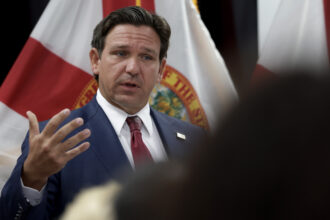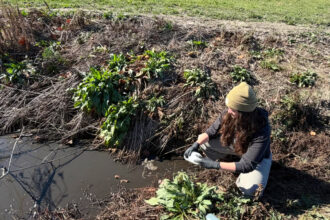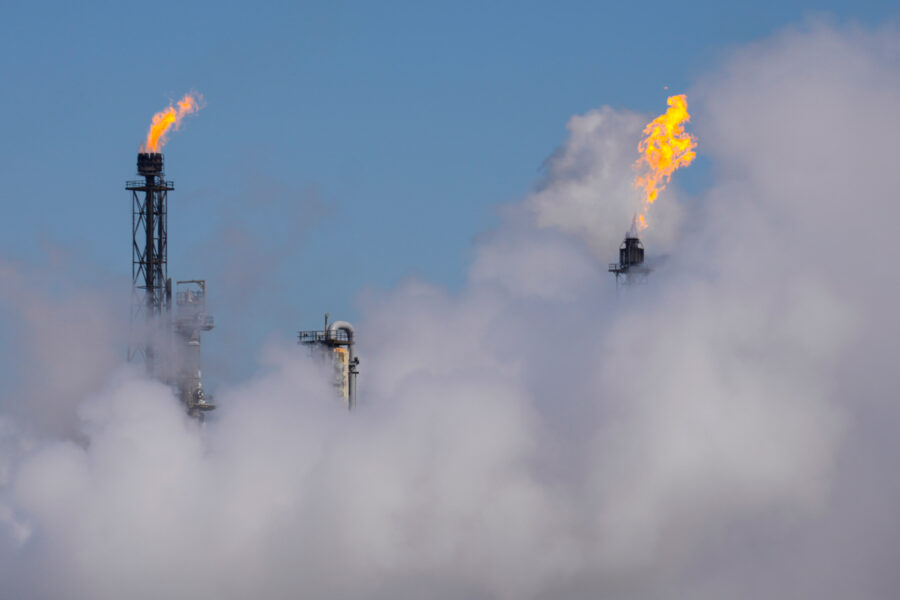WASHINGTON—The Canadian builder of the Keystone XL pipeline has lashed out at the Environmental Protection Agency for recommending that the United States and Canada work together to reduce the emissions of greenhouse gases from the tar sands crude that the pipeline would carry to refineries on the U.S. gulf coast.
The suggestion “ignores the fundamental sovereignty of the Canadian government,” said Shawn Howard, a TransCanada spokesman, in a message to reporters on Tuesday.
The EPA made its recommendation on Monday in a scathing critique of the State Department’s latest environmental impact study, part of the process of deciding whether to grant the pipeline a presidential permit. The study, released in March, suggested that the pipeline would have no significant environment impact. They called it “insufficient” and asked for significant changes to protect the environment.
The agency estimated that greenhouse gases emitted because of Keystone might approach a billion tons of carbon dioxide over the next half century. To mitigate the effects on the climate, the EPA called for “an exploration of specific ways that the U.S. might work with Canada to promote further efforts to reduce GHG emissions associated with the production of oil sands crude.” For example, it suggested a joint effort on carbon capture and storage.
TransCanada, which submitted its own lengthy comments to the State Department on the draft environmental study but has not yet released them publicly, said it plans to rebut the EPA in point-by-point, “fact-based” reply.
Its initial reaction, according to Howard, was that “the scope and tone of the EPA’s comments are somewhat surprising because EPA has been a cooperating agency throughout the four-plus year NEPA review of the Project. As a result, the EPA—as well as almost two dozen local, state and federal agencies—have been intimately involved in the details of this review and are well aware of the four federal environmental impact statements that have already been published by the Department of State on this project. There are no ‘new issues’ identified in their letter.”
EPA has indeed commented on two previous impact statements dealing with the controversial pipeline, and has urged the State Department before to seek mitigation of the project’s greenhouse gas emissions. Other points raised in the latest EPA critique are new, such as those stemming from recent pipeline spills and the risks of carrying and cleaning up diluted bitumen, or dilbit, from the tar sands.
Click here for an InsideClimate News chart showing the EPA’s responses to two previous environmental reviews.
But EPA’s suggestion that Canada and the province of Alberta should do more, together with the U.S., to cut greenhouse gas emissions, seemed especially to bother TransCanada, whose project has long been at the center of the dispute over the nation’s energy future. Environmental advocates are using the Keystone XL as a litmus test for President Obama’s commitment to tackle climate change and embrace clean energy.
“The EPA’s recommendation that the State Department explore ways for the U.S to involve itself in ways to reduce GHG emissions from the Canadian oil sands ignores the fundamental sovereignty of the Canadian government, as well as the significant steps that Canada and Alberta have already taken in this direction,” Howard said. “Respectfully, this goes far beyond the mandate of the EPA and legislators and others would not appreciate other countries interfering in issues of American federal or state sovereignty.”
The EPA had no immediate comment on TransCanada’s complaint.
The United States and Canada have a decades-long history of working together on climate change and other environmental issues, such as those involving acid rain, ozone-depleting chemicals, and boundary waters.
In 2009, Canada and the United States set up a “clean energy dialogue” to work together on climate change and related issues.
Last year, the U.S. Energy Department and Canada’s Environment Department issued a report detailing a wide variety of collaborative research and policy approaches, including mutual work on capturing and storing carbon emissions. Some such work is already underway.
Nor is there anything unusual about the State Department working with other countries on ways to mitigate greenhouse gas emissions. On a recent trip to Asia, Secretary of State John Kerry worked out a significant agreement with China promising to do just that.
TransCanada, for its part, has been deeply involved in the workings of states south of the border to clear the way for its pipeline. For example, it pressed Nebraska’s governor and legislature to approve the new route for the pipeline through the state. That new route led to TransCanada’s renewed permit application, the very subject of the State Department’s environmental review and the EPA’s critique.
About This Story
Perhaps you noticed: This story, like all the news we publish, is free to read. That’s because Inside Climate News is a 501c3 nonprofit organization. We do not charge a subscription fee, lock our news behind a paywall, or clutter our website with ads. We make our news on climate and the environment freely available to you and anyone who wants it.
That’s not all. We also share our news for free with scores of other media organizations around the country. Many of them can’t afford to do environmental journalism of their own. We’ve built bureaus from coast to coast to report local stories, collaborate with local newsrooms and co-publish articles so that this vital work is shared as widely as possible.
Two of us launched ICN in 2007. Six years later we earned a Pulitzer Prize for National Reporting, and now we run the oldest and largest dedicated climate newsroom in the nation. We tell the story in all its complexity. We hold polluters accountable. We expose environmental injustice. We debunk misinformation. We scrutinize solutions and inspire action.
Donations from readers like you fund every aspect of what we do. If you don’t already, will you support our ongoing work, our reporting on the biggest crisis facing our planet, and help us reach even more readers in more places?
Please take a moment to make a tax-deductible donation. Every one of them makes a difference.
Thank you,









